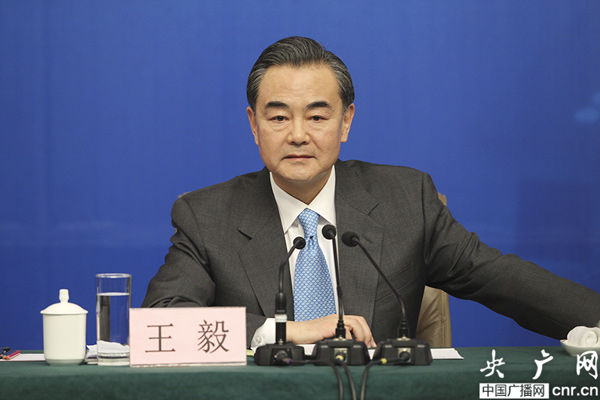


File photo of Chinese Foreign Minister Wang Yi. (Photo/cnr.cn)
BEIJING, Feb. 22 -- Chinese Foreign Minister Wang Yi will pay an official visit to the United Statesfrom Tuesday to Thursday, at the invitation of U.S. Secretary of State John Kerry, Foreign Ministry spokeswoman Hua Chunying said on Monday.
"We hope that China and the U.S. will arrange high-level exchanges and dialogues for 2016, discuss practical cooperation and the handling of sensitive issues to promote the sustainable, healthy and stable growth of bilateral relations through the visit," Hua said at a regular news briefing.
Responding to looming UN sanctions against the Democratic People's Republic of Korea (DPRK) for missile launches, Hua said "China and the U.S. are expected to exchange views on the Korean Peninsula nuclear issue during Wang's visit," adding that the two sides have been in communication over the issue recently.
The UN Security Council is discussing sanctions against the DPRK over its recent nuclear test and satellite launch using ballistic missile technology.
China supports the UN Security Council adopting a new and strong resolution against the DPRK while urging relevant parties to avoid actions that could escalate tensions, Hua said.
She renewed the call for dialogue and promoting the denuclearization of the Korean Peninsula and a truce-to-peace mechanism in parallel.
When asked about the message that China will send to the U.S. on the South China Seaissue, Hua said the U.S. should honor its commitment of taking no position on competing territorial claims and stop playing up the issue or creating tension.
Hua pointed out that the U.S. is not a party involved in the South China Sea dispute and the South China Sea issue is not, and should not become, a problem between China and the U.S..
She called on the U.S. to play a constructive role on the issue as maintaining peace and stability on the sea serves the common interest of China and U.S. as well as all parties concerned.
Hua criticised the U.S. for stirring hype over the "militarization" of the South China Sea. "The U.S. side is misusing the concept. The deployment of defense facilities on China's own territory is no different from what U.S. does in Hawaii."
The U.S., which has sent military vessels and planes to areas in the South China Sea to conduct close-in reconnaissance, is the source of tension and militarization of the South China Sea, Hua said.
China's construction on its own islands in the South China Sea is for civilian purposes and providing better international public goods. The deployment of limited defence measures is granted by international law to sovereign states, and has nothing to do with "militarization", according to Hua.
 2016 Miss Chinatown USA pageant held in San Francisco
2016 Miss Chinatown USA pageant held in San Francisco Ancient pagodas across China
Ancient pagodas across China Beijing Film Academy starts 2016 entrance exam
Beijing Film Academy starts 2016 entrance exam Wedding dress show up in the air
Wedding dress show up in the air Have you ever taken these beautiful subways in China?
Have you ever taken these beautiful subways in China? Russian photographer brings fairytales to life
Russian photographer brings fairytales to life Chinese beauties, foreign models meet in Chengdu
Chinese beauties, foreign models meet in Chengdu Awesome! Aerial pictures taken on J-11 fighter
Awesome! Aerial pictures taken on J-11 fighter A foreign girl explains what China should be proud of
A foreign girl explains what China should be proud of Top 20 hottest women in the world in 2014
Top 20 hottest women in the world in 2014 Top 10 hardest languages to learn
Top 10 hardest languages to learn 10 Chinese female stars with most beautiful faces
10 Chinese female stars with most beautiful faces China’s Top 10 Unique Bridges, Highways and Roads
China’s Top 10 Unique Bridges, Highways and Roads Shooting threat mixes online, offline violence
Shooting threat mixes online, offline violence Chinese peacekeepers face violence, food shortages on UN mission
Chinese peacekeepers face violence, food shortages on UN mission Regulations concerning menstrual pain leave a step in the right direction
Regulations concerning menstrual pain leave a step in the right directionDay|Week